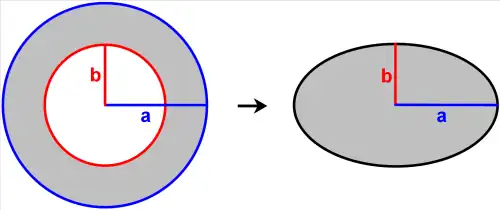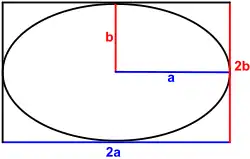Golden ellipse
A golden ellipse is an ellipse in which the aspect ratio of its two semi-axes and corresponds to the golden ratio.
Equivalent characterization

Given is a annulus with outer radius and inner radius as well as an ellipse with semi-major axis and semi-minor axis , where and are positive real numbers.
Then the ratio corresponds to the golden ratio if and only if the annulus and the ellipse have the same area. [1]
The proof results from the following equivalence chain:
Since only the positive solution is possible, after division by we get:
Relationship to the golden rectangle

The golden ellipse can be inscribed in a golden rectangle with the side lengths and .[2]
References
- ^ A. D. Rawlins: in The Changing Shape of Geometry: Celebrating a Century of Geometry and Geometry Teaching, Cambridge University Press (2003), ISBN 0-5215-3162-4, S. 308
- ^ Claudi Alsina, Roger B. Nelsen: Perlen der Mathematik - 20 geometrische Figuren als Ausgangspunkte für mathematische Erkundungsreisen , Springer Spektrum, Springer-Verlag GmbH Berlin 2015, ISBN 978-3-662-45460-2, page 141
Further reading
- Anthony David Rawlins: A note on the golden ratio. Mathematical Gazette, 79, (1995), page 104
External links
- Daniel Favre: Golden ratio (Sectio Aurea) in the Elliptical Honeycomb ResearchGate, January 2016
- Tadeusz E. Dorozinski: Goldene Ellipse on 3doro.de